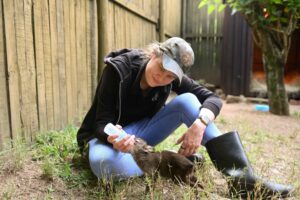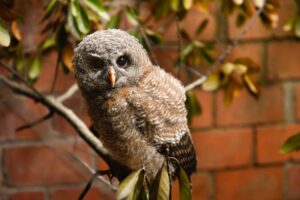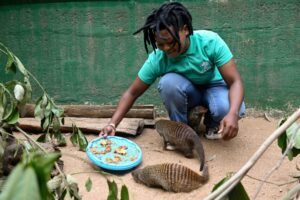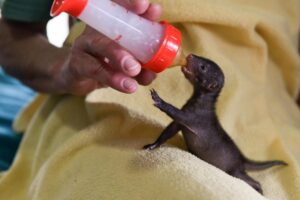
Zoe Dougall, a nurse at the Centre for Rehabilitation of Wildlife (CROW) gives this 2-month old Blue Duiker a feed. This little one was found abandoned and brought in by the Kloof and Highway SPCA. This duiker will call CROW home for at least another seven months.
With 355 animals currently in their sanctuary, and with an impressive 164 998 animals rescued over 43 years, the Centre for Rehabilitation of Wildlife (CROW) calls on South Africans to join in commemorating World Animal Day on 4 October, and appeals for financial support for the astonishing work they do.
“The theme for World Animal Day 2023 is ‘Great or Small, Love Them All,'” explains Clint Halkett-Siddall, Operations Director of CROW.
“This is exactly what we do –we take in all manner of wildlife that have been injured, displaced, or abandoned, nurse them back to health, rehabilitate them, and release them back into their natural habitats. We love them all!”
“Our challenge is now to galvanize some serious financial support to enable us to continue to do this important work.”

This juvenile African Wood Owl, was brought in to CROW 6 weeks ago weighing only 80g, It was found in the Northdene area when he fell out of his nest. Unfortunately, he was not able to be put back.
CROW was adversely affected by COVID, which resulted in the loss of two years of international volunteer income – which contributed to a sizeable portion of their running costs. This together with the repercussions of the floods and riots, and increased overheads especially on animal feed and fuel, means that the centre has almost depleted its financial reserves.
“We are appealing for a renewed burst of financial support from individuals and companies, to enable us to keep our doors open and help the 3000-4000 indigenous wild animals that we care for each year. Without this support these animals will be left without assistance, with no chance of being nursed back to health, and released back into the wild,” says Halkett-Siddall.
CROW is Durban’s only registered and fully permitted wildlife rehabilitation centre providing indigenous wildlife with a second chance at a free, safe, and sustainable life in the wild. They also work with Threatened or Protected Species (TOPS) Terrestrial and Marine species.

Animal keeper Thobeka Mpangele feeds a troop of mongooses at CROW. This was one of three mongoose troops formed from orphaned pups last summer. They have overwintered at CROW and now that their release site has had its first good summer rains this troop will be released at the end of October.
The Centre works with all indigenous mammal species, reptile species, and bird species. Some of the animals currently on property include TOPs Nile crocodile, blue duiker, and Blesbok, as well as grey duiker, genet, scrub hare, rock hyrax, banded mongoose, water mongoose, spotted eagle owl, wood owl, spurwing goose, Egyptian geese, egret, terrapin, garden variety birds, bush baby, vervet monkeys, leopard tortoise, eastern hinge tortoise, labots tortoise and specs tortoise.
“Due to financial constraints, we have had to cease after-hours services and if funding does not improve we will have to put on hold on rescues and collections,” he explains.

An orphaned baby water mongoose is given its feed at CROW. Feeding the wildlife in the facility requires many resources and is time intensive starting at 6am and for some species can continue throughout the night.
“We now also have to limit the intake of Egyptian Geese and vervet monkeys which are robust urban dwellers but very expensive to feed.”
CROW gets no government funding and relies solely on public support.
“We are appealing to people who care about wildlife and our environment to assist us by donating to Hope for Our Wildlife – CROW’s Emergency Appeal. Any donation in any form is most welcome to keep our doors open to animals in need.”
Photography by Val Adamson
- Donations can be made at the CROW website.


Leave a Reply or Follow